IronSocket VPN Review (2024): Great for Tech-Savvy Users
While it may not be as popular as some other premium VPN providers, IronSocket has been around since 2005.
It all started in 2005 with the launch of the website HideMyNet.com. Hong Kong-based Pusa and Daga, the company responsible for the website, sought to improve their service by adding VPN and DNS proxy technologies. In 2013, they went through a large-scale rebrand, and IronSocket was born.
IronSocket still offers VPN and proxy services, and its motto is “Be safe, be private, be free.” We were eager to put this slogan to the test. You’ll find the results of our thorough tests in this IronSocket review.
IronSocket: Short Review
| Pros | Cons |
|---|---|
| Good speeds | Keeps connection logs |
| Offers different protocols including OpenVPN | Small server network |
| Allows anonymous payments | The interface can be (unnecessarily) overwhelming |
| Fast downloads with special torrenting servers | Relatively expensive |
| Customer service could be improved |
IronSocket is a secure VPN that offers good speeds and lots of customization options for tech-savvy users.
Although this VPN provider is located in Hong Kong, which is not part of the Five Eyes Alliance, the company logs some data. In its privacy policy, IronSocket says it may turn over “certain limited” user data to third parties, including the authorities if it served with information requests.
The VPN provider also says it may share some non-personally identifiable data with third parties for marketing, advertising, and research purposes. This is not ideal for privacy.
Compared to cheap premium VPNs like Surfshark, IronSocket is a relatively pricey VPN, and there’s no free version.
On the bright side, IronSocket doesn’t impose any bandwidth limits on users and comes with P2P servers that provide fast speeds. It is a bummer that it can’t unblock Netflix’s US library.
IronSocket is available for mobile and desktop devices—it is compatible with all the top operating systems. You can even install this VPN on your router or gaming console.
| 💵 Price |
From $4.16 a month |
| 📱 Operating systems | Windows, Mac, iOS, Android |
| 💻 Connections | 3 |
| 💳 Payment methods | PayPal, Other, Credit card, Cryptocurrency |
| 🔒 Protocols | OpenVPN, L2TP/IPsec, PPTP |
| 📥 Torrent options | Torrenting allowed |
| 📅 Money-back guarantee | Money-back guarantee, 7 Days |
| 📋 Logs | Connection Logs |
| 🎬 Works with |
|
Speed – How Fast Is IronSocket

Users don’t just want excellent functionality from a VPN, but also good speeds. You need decent connection speeds to browse the web smoothly and stream videos.
We tested IronSocket’s speed thoroughly, and it earned a score of 7.5/10. These are our conclusions:
- IronSocket offers good browsing and streaming speeds.
- Even some distant IronSocket servers (in our case, the US servers) maintain impressive speeds.
- There is some lag during online gaming, most likely due to ping.
- We recommend you use a server close to you—ideally a special P2P server—for torrenting and downloading to enjoy good (or even great) speeds. If not, your download will be very slow.
Speed tests IronSocket VPN
To give you a fair assessment of IronSocket’s speed, we used Ookla’s renowned speed website, Speedtest.net. First, we measured our “base speed” (i.e. our speed without connecting to a VPN server). This is very important as we can see how much using IronSocket affects our internet speed. You’ll find the results below.
| Server location | Download (Mbps) | Upload (Mbps) | Ping (MS) |
|---|---|---|---|
| No VPN | 94.77 Mbps | 92.66 Mbps | 5 |
| Local (Netherlands) | 32.93 Mbps | 31.55 Mbps | 8 |
| US East Coast | 77.44 Mbps | 86.74 Mbps | 94 |
| US West Coast | 43.21 Mbps | 34.07 Mbps | 165 |
| United Kingdom | 87.73 Mbps | 87.12 Mbps | 17 |
| Germany | 67.62 Mbps | 86.63 Mbps | 15 |
| France | 80.69 Mbps | 87.12 Mbps | 19 |
| Japan | 16.73 Mbps | 15.37 Mbps | 259 |
| Spain | 64.41 Mbps | 11.61 Mbps | 36 |
Interestingly, the servers in the US and France we tested were faster than our local server. This is quite surprising, considering the distance. A lot depends on the specific VPN server as well, so it’s certainly not impossible.
It’s good to see that IronSocket offers decent speeds for these servers. The fact our local server slows down our traffic so much on paper is not necessarily a big issue. After all, the most important thing is how these servers perform during day-to-day use. Of course, we tested this as well, and you’ll find the results below.
Speed during daily use
To put IronSocket’s speed to the test, we used it extensively to perform various online tasks. Overall, we were satisfied with our browsing and streaming speeds. We could visit webpages and stream YouTube videos. Although we noticed our connection speeds were slightly slower, this is not a deal-breaker in our books.
We were somewhat surprised to find that with the right server, IronSocket offers very fast torrenting speeds. When we used a P2P server close to our location, we could download large torrent files at about 25 Mbps. This is only 1 or 2 Mbps lower than our normal speed when downloading and torrenting large files.
We have to say, however, that if you use a normal server or a server that is far away, torrenting and downloading can be very slow. This is something to keep in mind, especially if you live quite far away from the nearest IronSocket (P2P) server. In that case, you might want to try a faster VPN.
While playing an online multiplayer game, we noticed a little lag, especially while using a distant server. This was most likely due to the high ping. All things considered, we are satisfied with IronSocket’s speeds.
Safety – How Secure Is IronSocket?

Security is one of the most important aspects of a VPN. People trust VPNs to protect their IP addresses and enable them access the web anonymously. We rely on VPNs to encrypt our data and keep it safe from prying eyes.
After assessing IronSocket’s security features, we gave it a score of 7.0 for safety. These are our conclusions on IronSocket’s security:
- IronSocket offers several great VPN protocols, including the OpenVPN protocol.
- IronSocket logs some user data.
- It’s possible to purchase a subscription anonymously.
- IronSocket offers a kill switch.
VPN protocols
IronSocket offers three VPN protocols and three proxy protocols. The VPN protocols include OpenVPN, L2TP/IPSec, and PPTP. Of these three, we recommend OpenVPN. This is an all-around good protocol that balances speed and security.
L2TP is useful if OpenVPN is not supported on your device, and you’re still aiming for a high degree of security. It is important to note that L2TP is often slower than OpenVPN. This protocol is a good fit for iOS and Android devices.
The third VPN protocol IronSocket offers is PPTP. This protocol has been praised by many because of the great speeds it can achieve with the right configuration. However, the fast speeds come at the expense of reduced security.
PPTP only supports encryption up to 128 bits, which is significantly less advanced than the industry-standard AES 256-bit encryption OpenVPN offers. However, if security is not a priority and you’re just using a VPN to unblock content online, this protocol could prove useful.
Logging and privacy
IronSoket doesn’t keep any activity logs. However, its privacy policy shows that it collects a vast amount of user data. Here’s a breakdown of the data that IronSocket collects about you when you visit its website and use its services.
| Source of data | Collected data |
|---|---|
| The IronSocket website |
|
| User registration |
|
| IronSocket app |
|
According to IronSocket, this data is stored temporarily, typically for 72 hours. The fact that the word “typically” is used doesn’t sound too reassuring—especially if you consider the amount of data IronSocket collects.
At least, IronSocket clearly states what it uses the above information for: “to manage your account, to provide their services and to prevent fraud and abuse.”
On a positive note, IronSocket’s privacy policy says it does not sell or trade user data commercially. The company also doesn’t log the contents of what you’re doing online.
What is slightly worrying from a privacy standpoint is that IronSocket clearly states that it will cooperate with information requests that are admissible under Hong Kong law.
Ideally, when this is the case, you want to have a VPN provider with a strong no-logging policy that doesn’t even register the VPN server you use and your connection timestamps — such as ExpressVPN. Nevertheless, it is somewhat reassuring that at least IronSocket won’t be able to hand over information about users’ browsing histories.
Kill switch
IronSocket has a built-in kill switch. This is automatically enabled, which is a good thing. In the event of an interrupted VPN connection, the kill switch disables your internet connection. This ensures your data is not exposed.
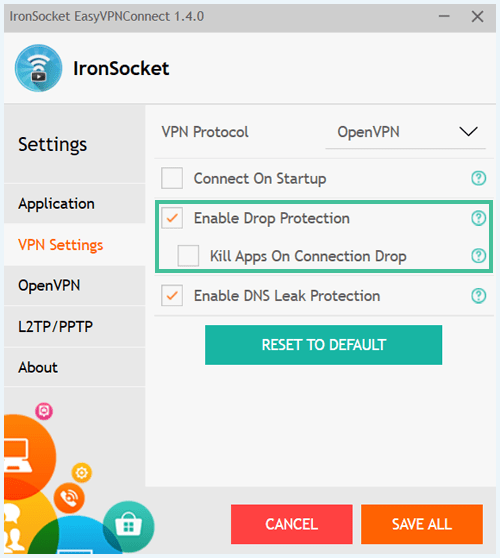
However, if there are apps or websites that you don’t want to lose connection to the internet when the kill switch is activated, this isn’t an issue. You can use IronSocket’s split-tunneling feature to specify which domains and apps to route through the VPN connection (more on this later).
What information does IronSocket need for registration?
To create an IronSocket account, you need to provide an email address. If you don’t want to use your regular email address, you can create an anonymous email account.
Since there’s no free version of IronSocket, you will need to choose a payment method. If you pay using a credit/debit card or PayPal, the provider will get access to the personal details associated with your card or account. Fortunately, IronSocket also offers two ways you can pay anonymously — using Bitcoin or a gift card.
Note: Since IronSocket logs website visitors’ IP addresses, you technically already need to be connected to a (temporary) VPN to get your IronSocket subscription completely anonymously. You need a safe free VPN for this purpose.
Usability – How User-Friendly Is IronSocket?

While it’s important for a VPN to be fast and secure, that counts for nothing if the VPN application isn’t user-friendly. That’s why we always test the usability of every VPN we review. IronSocket scored a 5.0 in our usability tests. Here are our findings:
- IronSocket’s website is clear and easy to navigate.
- Installation is easy.
- The application is easy to use. Tech-savvy VPN users can do a lot of custom configurations.
- IronSocket doesn’t offer a live chat feature.
IronSocket Website
The IronSocket website is easy to navigate. The only thing we can really fault them for is having “busy” pages with bright colors and little space between elements to calm things down a bit. We found this to be a bit overwhelming.
There is a menu at the top of the website which allows you to easily locate and visit different pages. We love the fact that there is a Network option on the menu and one that takes you to the Support page. Some VPNs make it quite difficult to find this information, so it’s good that IronSocket doesn’t.
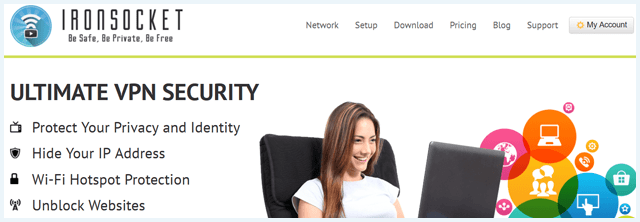
IronSocket installation process
IronSocket works with Windows, iOS, macOS, and Android devices. It is also compatible with routers and gaming consoles.
At the moment, IronSocket’s EasyVPNConnect app is only compatible with devices running on Windows 7, 8, and 10. The company has OpenVPN clients for other operating systems. According to IronSocket, the native EasyVPNConnect apps for these devices are still under development.
You can easily install this application by following the steps below:
- Go to the IronSocket subscription page.
- Choose a subscription plan, and click on the Order Now button below the subscription of your choice.

- Fill out the required details. Remember your password, as you’ll need this later to sign in. Consider using a good password manager for this.
- Choose your add-ons. This refers to the number of possible simultaneous connections and IP addresses for proxies. The minimum is three (included in your plan) and the maximum is eight.
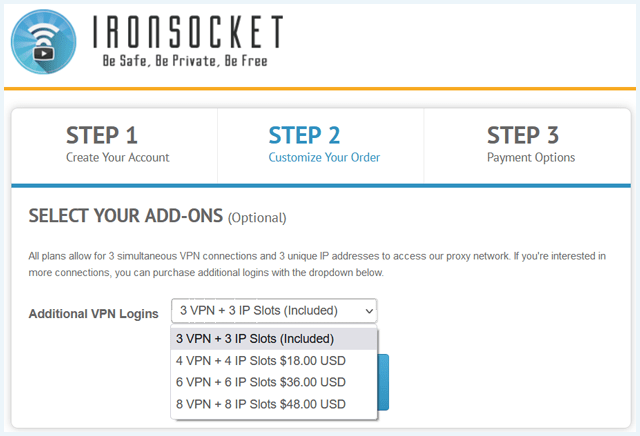
- Choose your payment method and complete the transaction.
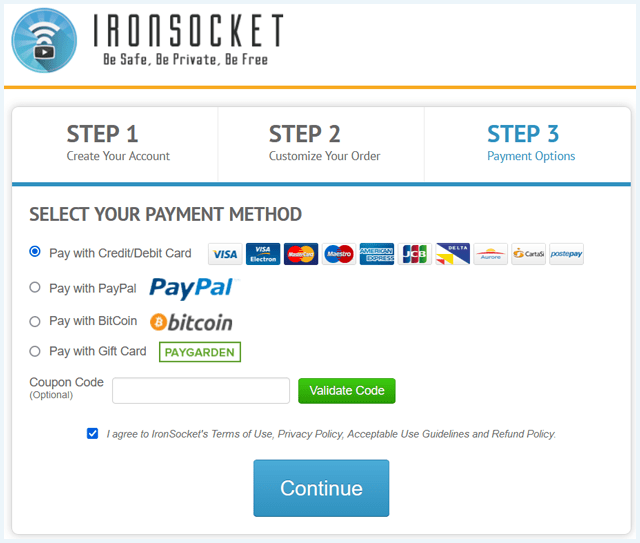
- Return to the IronSocket website (this usually happens automatically after you finish the transaction) and click on “Download” at the top of the page. Choose the right software for your operating system.
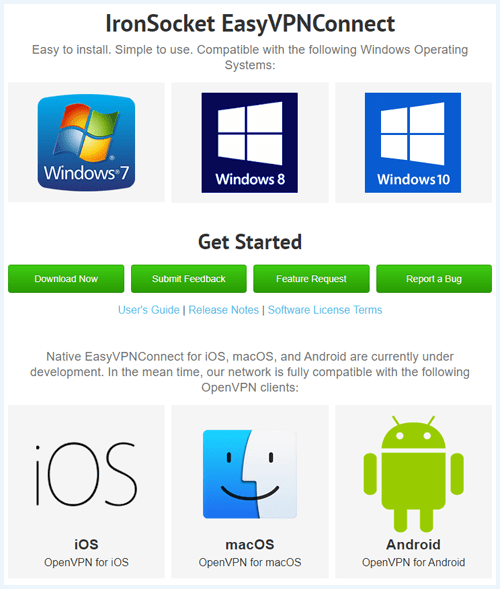
- Open the installation file and go through the installation.
- Open the app.
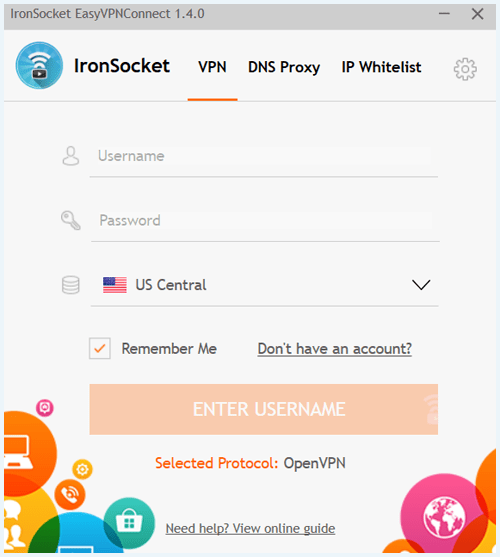
- Fill out your username and password. Please note that these details are different from your account username and password. You’ll find your login info under “Subscriptions” when you log in on the IronSocket website.
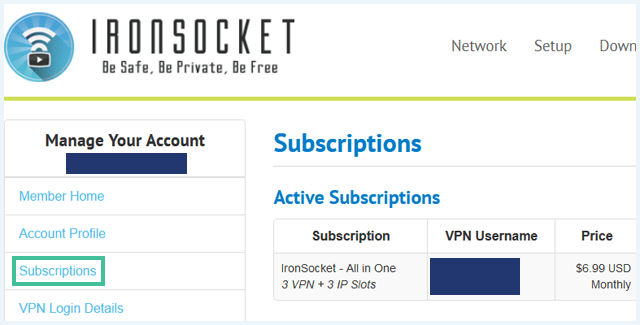
- Choose a server and click on “Connect.”
You are now connected to IronSocket.
While using the app, we couldn’t click on the Connect button sometimes, supposedly because of a firewall-related issue. Here’s how you can easily solve this on a Windows device:
- Click on the Windows button/icon (on your keyboard or screen).
- Type “cmd.” Click on the first result that appears, and select “Run as administrator” to access Command prompt.
- Copy and paste the following line of code in the editor that appears: netsh advfirewall firewall add rule name=”Block IP address – 66.171.248.178″ dir=out action=block remoteip=66.171.248.178
Now open the IronSocket app. The issue should be resolved. In our case, doing this helped to make the button active again.
IronSocket’s appearance and ease-of-use
The IronSocket app and website interface are straightforward and minimalistic. It is different from most VPN apps we’ve seen, as there are a lot of customization options. These two sentences may seem contradictory, however, they’re both true.
Many VPN users will never wander beyond the very simple first part of the app where you fill out your login details, select a server, and click on connect.
However, for those who want to, there are options to customize a lot of features. For starters, to the right of the standard VPN tab, you can configure two DNS proxy servers.
You can also whitelist specific IP addresses, but this requires an authorization token from the IronSocket website. Consult this IronSocket page to learn how to go about it.
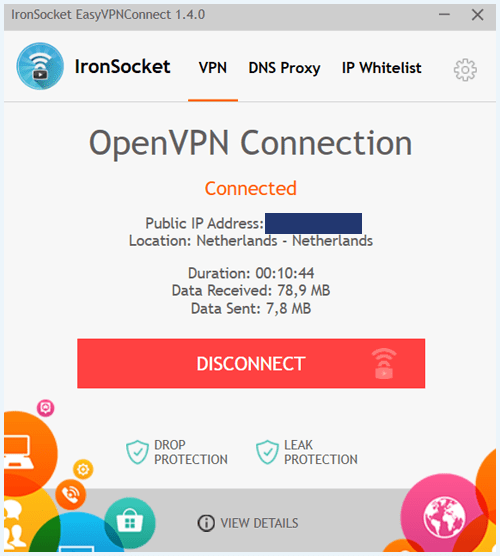
By far, the most complex part of the IronSocket app is the settings section. You can customize the way the app behaves in different ways.
When you go to VPN Settings, you can choose your preferred VPN protocol (OpenVPN, L2TP, or PPTP). You can also enable the kill switch and choose which apps will respond to it and enable or disable DNS Leak protection.
Interestingly, the settings also include a very extensive customization menu for the OpenVPN protocol and you can change the Maximum Transmission Unit (MTU) of the LT2P and PPTP protocols. The MTU can affect your internet speed, so it’s definitely worth experimenting with this if you’re using the L2TP/PPTP protocol.
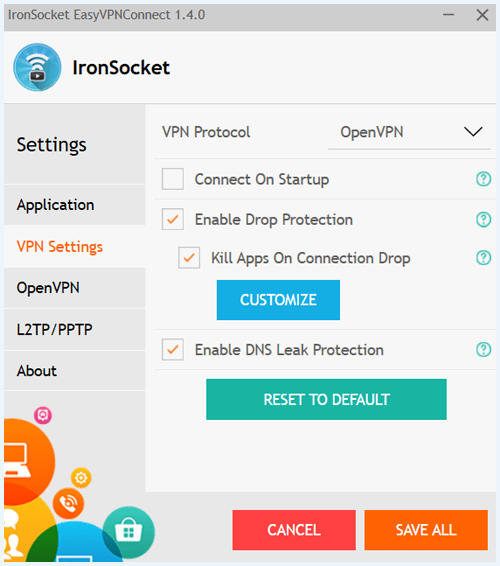
IronSocket’s app: is the complexity worth it?
At VPNOverview, we try to find VPN solutions that work for a large majority of users, and we evaluate VPNs with this in mind. Considering this, we have to ask ourselves how useful all the bells and whistles that IronSocket offers are for the average user. We’re sure there are many tech-savvy users who would enjoy these features and find them very useful, but the majority may not.
We feel IronSocket suffers from a somewhat common flaw that plagues tech solutions: it seems the VPN was created with network specialists/engineers in mind, rather than the average user. It contrasts starkly with VPNs that also offer a lot of features but have a more user-friendly app, such as NordVPN or CyberGhost.
We strongly doubt most users will want to change something as complex as the Maximum Transmission Unit of a protocol or the encryption level of the OpenVPN protocol, especially if they have the option to choose between those features and the dedicated streaming servers that a VPN provider like CyberGhost offers. Then again, IronSocket may have been created specifically for the niche market of tech-savvy network enthusiasts.
Pricing and payment methods
IronSocket is a relatively pricey VPN. If you’re looking for a real bargain, we recommend checking out our article on the best cheap VPNs instead. IronSocket offers three different subscription plans, and each allows for three simultaneous connections (unless you increase this by buying an add-on). You’ll find the three subscriptions below:
- A monthly subscription costs $6.99.
- A yearly subscription is available for $49.95—this comes down to about $4.16 a month.
- A six-month subscription costs $35.95—this is about $6 a month.

All the subscription plans offer the same features (but you can purchase an add-on for more connections), and they all come with a seven-day money-back guarantee. To get your money back, you need to contact IronSocket’s customer service team.
You can pay for your subscription using a credit card, PayPal, Bitcoin, and prepaid cards (gift cards).
Note: You can’t use the seven-day money-back guarantee if you pay using a gift card or Bitcoin.
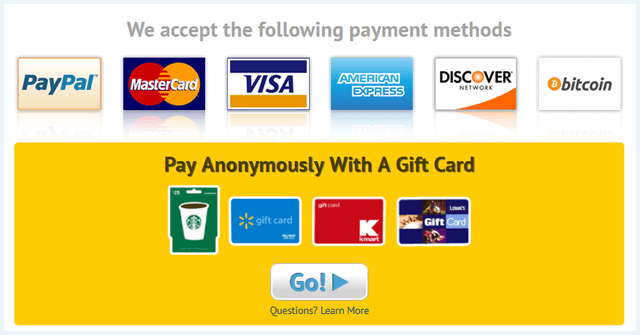
Customer service
We think IronSocket could improve on its customer service. For starters, it doesn’t have a live chat feature. To be among the best VPNs out there, you need to offer live chat.
IronSocket has a contact form and support ticket system. When we submitted our question through the contact form, it took a while (a few hours) to get a reply. Also, we were given some contradicting information by the customer support agent.
They told us IronSocket offers a 30-day money-back guarantee on all subscriptions. However, on its website, IronSocket states that subscriptions only come with a seven-day money-back guarantee. So, either the website is outdated or the customer service agent was wrong — either way, the inconsistency doesn’t show off this VPN provider very well.
IronSocket has an extensive FAQ and a Getting Started guide. To use the latter, you need to be logged in on its website.
Server Network

A large server network is one of the basic requirements for VPNs as this helps with unblocking geo-restricted content and maintaining good speeds. The more server locations a VPN offers, the more foreign streams and other content you can unblock, and the lesser the chances of network congestion.
If a VPN has few servers and a lot of users, these users will probably experience low speeds because of crowded servers. After assessing IronSocket’s server network, we gave it a score of 7/10.
These are our conclusions after assessing IronSocket’s server network:
- IronSocket offers just over 90 servers in 38 countries all around the globe. Its server network is limited.
- IronSocket offers different proxy servers, including HTTP, Socks5, and DNS proxies.
- IronSocket doesn’t offer dedicated IP addresses.
Number of servers and locations
IronSocket offers over 90 servers in 36 countries, and these servers do not have bandwidth limits. The distribution of their servers is not bad. While we’d say having servers in nearly 40 countries is quite impressive for a non-premium VPN, IronSocket has only one server in Africa and this is quite disappointing.
IronSocket’s server network doesn’t come close to those of many of the best providers out there. For example, Private Internet Access has over 33,000 servers in 78 countries, while NordVPN has over 5000 servers in 60 countries.
IronSocket has servers in the following regions and countries:
| Region | Countries |
|---|---|
| Asia (Pacific) | Australia, Hongkong, India, Indonesia, Japan, Luxembourg, New Zealand, Philippines, Singapore, South Korea, Taiwan, Thailand |
| Europe | Austria, Belgium, Cyprus, Denmark, Finland, France, Germany, Iceland, Ireland, Italy, Luxemburg, Netherlands, Norway, Poland, Russia, Spain, Sweden, Switzerland, Ukraine, United Kingdom |
| Middle East | Egypt, Saudi Arabia, Turkey |
| North America | Canada, Mexico, United States |
| South America | Argentina, Brazil, Mexico |
Proxy servers
IronSocket doesn’t just offer VPN servers, but also proxy servers. These servers are located in the countries listed above. There is one exception: IronSocket also offers an HTTP proxy server in Colombia, although it doesn’t offer VPN servers in this country.
IronSocket’s HTTP proxy is an easy-to-configure proxy service that anonymizes your traffic and gives you access to content that would otherwise be inaccessible in your country. It changes your IP address just like a VPN server does.
Unfortunately, this proxy service doesn’t support any form of encryption. We strongly recommend using a VPN server instead for better security and privacy.
IronSocket also offers SOCKS5 proxies. It is possible to enjoy some level of encryption when using SOCKS5 proxies. After all, you can use the SOCKS5 protocol in conjunction with the SSH protocol to create a so-called SSH SOCKS tunnel. Although we didn’t find this option anywhere on the IronSocket website or in the app, the useful OpenSSH tool is compatible with SOCKS5 proxies.
Besides those, IronSocket also offers DNS proxy servers.
Note: This proxy does not support encryption.
IronSocket’s Options
Many users appreciate certain extra features in a VPN, apart from the security and privacy they offer. Some people use VPNs primarily to access certain streaming services (especially Netflix) or for torrenting.
We tested IronSocket to see how it performed when streaming and downloading torrents. Here’s what we found:
- It can’t unblock Netflix’s US library.
- It has P2P servers which perform remarkably well for torrenting and P2P file sharing.
IronSocket and Netflix
Streamers would be disappointed to know that IronSocket doesn’t work with Netflix US. However, we were able to access our local (Dutch) version of Netflix using IronSocket.
In a way, this is great news, because it shows that IronSocket has not been banned by Netflix. A lot of the VPN servers of some providers do not work with Netflix at all. However, if you’d rather be guaranteed access to foreign versions of Netflix, you might want to try out a true Netflix VPN.
IronSocket and torrenting
IronSocket offers optimized P2P servers for torrenting. While testing these, we could quickly and anonymously download various torrent files. We could also access The Pirate Bay without any issues.
Our Experience With IronSocket
IronSocket is a decent VPN, thanks to its pretty good speeds, adequate security measures, and torrenting capabilities. But it has some major flaws too, like the fact that it keeps logs and doesn’t unblock the Netflix US library. Also, its customer service could do with some improvement.
Considering the relatively high price of IronSocket’s subscription plans, we think there are other providers out there that offer better value, such as the VPNs in our top five list.
Do you have a specific question about IronSocket? Check out our FAQ below to see if we’ve answered them. If not, be sure to post your question in the comment section, and we’ll get back to you as soon as possible!
IronSocket uses the highly secure OpenVPN protocol, which means your data will be safely encrypted. However, IronSocket only offers AES 128-bit encryption and also stores some connection logs. If you’re looking for privacy-focused VPN providers, we recommend checking out our picks for the best no-log VPNs.
Unfortunately, we weren’t able to access the US version of Netflix using IronSocket. The IronSocket website, however, says the VPN is compatible with the US version of Netflix. If accessing the Netflix US library is your main reason for using a VPN, we recommend checking out our article on the best VPNs for Netflix.
Yes, you can. In fact, IronSocket has special servers which are optimized for just this purpose. Check out our full review for more information.
IronSocket doesn’t offer a free version. In fact, compared to many premium providers, it’s a bit pricey. If you’re looking for a good and safe free VPN, you can check out our article on the best free VPNs.
IronSocket offers three different subscription plans:
- One month for $6.99
- Six months for $35.95 ($5.99 a month)
- One year for $49.95 ($4.16 a month)
All subscriptions support a maximum of three simultaneous connections. You can increase the number of simultaneous connections by purchasing add-ons. Read our full review for more information.

